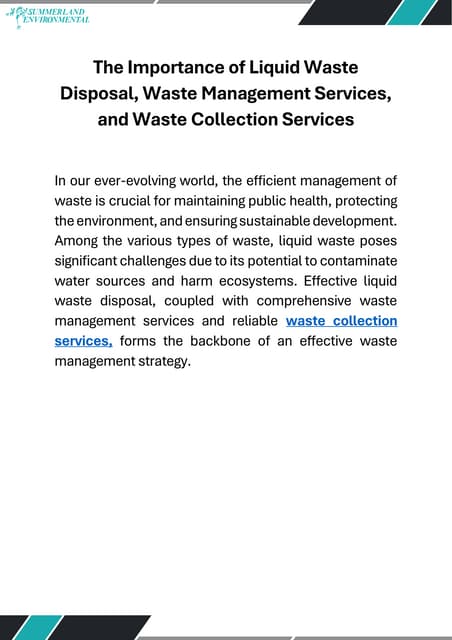Reclaim Waste Can Be Fun For Everyone
Table of ContentsThe 5-Second Trick For Reclaim WasteThe Main Principles Of Reclaim Waste The 5-Second Trick For Reclaim WasteSome Known Factual Statements About Reclaim Waste The Definitive Guide to Reclaim Waste
Discover the kinds, incidents, and forms of fluid waste. Domestic sewer waste refers to the waste and items from a residential sewage-disposal tank. This sort of waste is developed by people in houses, institutions, and other structures. This only includes sewage-disposal tanks that have a drain area. The proper monitoring and disposal of domestic sewer waste need fluid waste to be transferred to a sewer treatment plant where the proper approaches and equipment are related to detoxify and get rid of waste.
Industrial waste frequently includes possible risks, such as combustible products or a mix of fluid and strong waste products, and needs an extra advanced and comprehensive disposal process. The disposal of industrial waste generally entails the purification of waste before transportation to make certain safe and proper disposal. Industrial waste is developed from results and drainage of commercial processes and production.
This sort of waste can not utilize the exact same sewer monitoring transportation or processes as septic or industrial liquids. The hazardous waste administration procedure calls for the evaluation and testing of liquid waste before it goes through the disposal procedure (liquid waste removal). Overflow waste is the fluid waste that originates from drainage and excess stormwater in very inhabited locations or cities
Runoff waste can cause contamination and flooding if not taken care of correctly. Discover more about sewer cleaning and waste monitoring. Making certain correct waste administration can stop calamities and lower environmental damage. Both individuals in property settings and specialists in commercial or manufacturing industries can benefit from comprehending the procedures and laws of fluid waste administration.
Reclaim Waste - The Facts
Get in touch with PROS Services today to find out about our waste management and disposal solutions and the correct ways to look after the liquid waste you create.
(https://www.intensedebate.com/people/reclaimwaste1)This so-called 'wastewater' is not just a crucial resource yet, after treatment, will certainly be released to our land, rivers or the sea. Utilized water from toilets, showers, baths, cooking area sinks, laundries and commercial processes is understood as wastewater.

water utilized to cool down machinery or tidy plant and tools). Stormwater, a kind of wastewater, is runoff that streams from farming and city locations such as roof coverings, parks, yards, roadways, paths and rain gutters into stormwater drains pipes, after rain. Stormwater streams without treatment straight to local creeks or rivers, eventually getting to the ocean.
The Definitive Guide to Reclaim Waste
In Queensland, the majority of wastewater is treated at sewer treatment plants. Wastewater is delivered from residential or commercial websites with a system of drains and pump stations, known as sewerage reticulation, to a sewer therapy plant.
The Department of Natural Resources suggests neighborhood federal governments regarding handling, operating and preserving sewerage systems and treatment plants. In unsewered locations, city governments may require owners to install specific or home sewer therapy systems to treat residential wastewater from bathrooms, cooking areas, restrooms and laundries. The Department of Natural Resources authorizes the usage of home systems when they are confirmed to be reliable.
A lot of stormwater gets no treatment. In some brand-new class, therapy of click to investigate some stormwater to get rid of trash, sand and crushed rock has actually begun making use of gross contaminant catches. Wastewater therapy occurs in 4 stages: Removes strong matter. Bigger solids, such as plastics and other things incorrectly released to sewers, are removed when wastewater is passed via displays.
Wastewater then flows right into large containers where solids resolve and are gotten rid of as sludge. Grease and residue are skimmed from the surface. Makes use of small living microorganisms called micro-organisms to damage down and remove continuing to be liquified wastes and fine bits. Micro-organisms and wastes are incorporated in the sludge. Eliminates nitrogen and phosphorus nutrients that can cause algal blooms in our rivers and endanger marine life.
The Greatest Guide To Reclaim Waste
Nutrient removal is not available at all sewage treatment plants because it needs pricey specialist devices. Clear liquid effluent produced after treatment might still have disease-causing micro-organisms - liquid waste removal.

The majority of wastewater streams right into the sewage system. Under the Act, local federal governments provide approvals and permits for environmentally appropriate tasks (Ages) involving wastewater launches that could have a neighborhood impact.
Getting The Reclaim Waste To Work
Otherwise, examples are considered lab evaluation. Often numerous examinations are needed to develop the levels of each of the different toxins such as oils, hefty steels and pesticides in water. Tracking provides accurate info concerning water quality and can verify that permit problems are being fulfilled. The information acquired with tracking gives the basis for making water quality decisions.